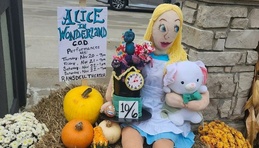A Song for Sara - Folksinger Sara Anderson has performed on every stage of life - now she faces her greatest challenge
Feb. 18, 2004
Sara Anderson has had a remarkable life, one that has been filled with the headiest kinds of successes and lows that would continue to bottom out her even when she thought they couldn‘t get any worse.But regrets? Traverse City resident, musician and media account executive, Anderson says she has none, even while she is busy now attending to “life-ending details,“ as she deals with an unstoppable cancer that is ravaging her body and another that is about to claim the life of her longtime companion, Dr. Tom Hall.
Many might see that as a remarkable attitude, especially for one who couldn‚t be blamed for feeling just a bit sorry for themselves, but those who know her simply see it as her nature. Even when life has dealt her setbacks, she has chosen optimism over pessimism, resolve over reticence and has looked forward, always forward.
Which is what she says she is doing now.
“I‘ve always tried to keep focused on what was next, even when things looked like they couldn‘t get worse,“ said Anderson. “Sometimes its taken awhile to get my plans together, but I made them and worked towards them and never lost sight of what I thought my goal was. Some people call that surviving, but I see it as living.“
SMALL TOWN ROOTS
Anderson‘s temperament seems to reflect the pragmatic Midwestern values she was raised with growing up in Marengo in Iowa County, IA, a town of just 2000. Her mother was a hospital administrator and her father a design draftsmen who had ties with the aerospace industry. Sara was the oldest of two other sisters, Joan and Marcia (who married here in Traverse City), and she recalls her childhood as being “wonderful and peaceful, like a Grant Wood painting.“
The small-town environment allowed her to discover and pursue her first love, music and performing. “I got to do everything because I went to a small school,“ she explained. “I could direct a play or be a soloist in music class or the church choir and I gravitated to that. Everything I wanted to try, I got a chance at, and I somehow knew that whatever I ended up doing, I would always be connected to a world of music and performing.“
She wasn‘t to achieve that dream for awhile, though. Anderson graduated from high school in 1965, went to work at the local bank, married her high school sweetheart and settled down to live on a farm. When the couple wanted to purchase more land, Anderson took an extra job singing.
It was 1969, and she fell in love with being a performer and singing the folk tunes penned by female singer-songwriters of the day such as Carole King, Joni Mitchell, Judy Collins and Joan Baez. An agent heard her and offered her a stint gigging at hotels around the country for 50 weeks out of the year. She borrowed $200 from the bank she worked at to buy a proper guitar -- a Guild 12-string -- and took a leave from her job. She was uncertain about how to make it all work, especially since she was married, but she knew she couldn‘t turn her back on the opportunity.
BAPTISM OF FIRE
“I had so many doubts. I didn‘t know how good I was or if the marriage would hold up or if I could fill a room, but I went to Milwaukee first, and then steadily got more jobs,“ she reflected. “I worked some amazing places, including Pheasant Run in Chicago, and for the next 12 years, I didn‘t have a day off. I learned my craft through a baptism of fire.“
Her marriage didn‘t survive, but her career soared. In 1980, she was living in California and appearing at the MGM Grand in Reno, NV, singing with a with full orchestra behind her. She was also working with Columbia Records and taking stabs at writing songs for movies. Her connections led to an offer of work in Europe. She left on October 1, 1980, and once there, it took about 14 years for Anderson to make her way back.
Anderson found plenty of work, audiences and recognition in Europe, especially the Scandanavian countries. She also quickly found romance. She had been in Norway just a month when she met Terje Bye Fjeldheim in Oslo and married him in November 1980. Things were idyllic for a time, and even when those who knew her expressed surprise at her having made such a quick decision to marry, Anderson completely believed she had met and married her soulmate.
By 1984, Anderson‘s parents were lobbying for her and her family, which now included daughter Tove, to return to the United States and arranged for a job for Terje in Iowa. Before they were to return, something happened that changed Anderson‘s life -- completely and forever.
VIOLENT ABUSE
Fearful about the move, intimidated by the prospect of going to America with a new family and little money, and haunted by his own personal demons, of which Anderson said she had little knowledge, Terje became irrational and abusive one night, and struck Anderson in the face with a wine bottle.
“It happened out of nowhere,“ she remembers. “He took a bottle of wine, smashed my face with it and called me a Nazi. The next morning, we tried to go on as if it didn‘t happen and it wasn‘t until 14 years later that I realized he took the house apart at that moment. There were incidents of very violent abuse that happened four times in those 14 years after that.
“It wasn‘t an every-Saturday-night event -- (it was) just spread out enough so that I thought maybe it was never going to happen again. It was all very much like a child in a tantrum. Afterwards, he would roll over and go to asleep and then apologize the next morning. I should have left after that very first time, but I didn‘t. When I finally got the courage to leave, it took three years after that to resolve everything.“
The last major event of abuse was a particularly violent episode with a hammer in 1993 that was witnessed by Anderson‘s daughter. With that, Anderson had had enough. “He said he was going to kill me and make it look as though I had fallen down the stairs, and I had no doubt that he meant it. I didn‘t know when he would do it, but I knew that he would if I stayed with him,“ she said.
TO TRAVERSE CITY
It still took a year for her to formulate her plan to leave, though she finally made her way back to the United States in 1994. Because her family had ties to the Traverse City area and she had long appreciated the region‘s beauty, she came here.
She and Terje waged war across different continents; he charging her with child abduction and she finally earning sole custody in Traverse City in 1996. Final visitation rights would be settled by 1998, but in the meantime, to support herself and Tove, she took two jobs, one as an account executive for WTCM and the other singing at the then-Top of the Park at the Park Place Hotel.
She sought support from the Women‘s Resource Center and took comfort in the assistance they provided her, especially when it came to the legal wrangling involved with international custody.
“When I got settled in Traverse City, I felt like I had truly come home,“ shared Anderson. “No matter what it was I needed help with, people here were nothing less than wonderful.“
Anderson particularly felt that way about Tom Hall, a local doctor specializing in urology whom she had in Traverse City in the early 1970s, and with whom she renewed an acquaintance after she was back in the area. Hall assisted Anderson‘s father with a prostate problem, and later, the two went to lunch, then dinner and eventually fell in love.
WHERE ARE WE NOW?
Fast-forward 10 years later, just past the time Anderson calls “the best ten years of my life.“ In 2003, Anderson found out that she had breast cancer that was showing itself as bone marrow cancer, and Hall, a veteran athlete and championship skier, learned that he had liver cancer. Currently, Hall is at home under the care of Hospice with his children gathered aound him, and Anderson‘s cancer has recently returned after a period of time when she had thought she might be able to beat it.
“Where are we at now?“ she aks. “We have wonderful care and support from friends to members of the medical community and we‘re doing our best to deal with everything on a day-to-day basis. We‘ve made all of our end of life plans, have said the things we need to say to people and are trying to transition to get to a place of peace in the time we have left. A part of that, for me, is telling this story. I guess I still feel there are things out there I want and have to do.“
A little bit of that has been done for her. TCTV2 film producer Joan Julin recently completed an hour-long documentary on Anderson‘s life entitled “A Song for Sara.“ The film will have its premiere public showing on Sunday, February 22 from 2-5 p.m. at the Traverse Area District Library. In it, Julin has gathered clips of Anderson from various TV programs and concerts she has been part of, and covers her performing accomplishments and her experiences as a battered spouse.
NEW CD
Another Julin, Joan‘s son Don, a well-known musical instrumentalist and record producer, has been helping Anderson document her musical career by repackaging all of her previous recordings -- including some she did abroad for the international OPUs 3 label -- into two CDs. One contains a song entitled “Wellworn Timber,“ an ode to domestic abuse that Anderson recently wrote and recorded with local group 3rd Coast.
“Both the documentary and the CDs are a little overwhelming, because most of us don‘t have our lives put down in such a way, but together, I hope they share the tale of my life and leave a clear history about who I am and what I‘ve tried to do with the time given me on this earth,“ said Anderson.
“The documentary, especially, sends the message that even women who are well-experienced and have successful careers can run into a stinker, and that when that happens, you need to watch out for your own life and call the professionals, the people who can help you, and let them do what they‘re trained to do. Life is too short for suffering, and you may even lose your life in the process. It‘s just not worth it.“
Anderson says that she is by no means “laying down to go to sleep forever“ just yet, and plans on spending the rest of her life surrounded by the people she cares about the most, including her daughter, and expressing her feelings about how much they mean to her.
“That‘s the single thing I plan to do everyday from her on out,“ she concluded. For anyone else in the same situation, whether it‘s cancer or domestic violence, I simply say talk to those around you about everything that‘s in your heart. Speak directly, let people know how much you love them and let them help you. In the end, the love you‘ve surrounded yourself with and accept and give back will make the greatest statement about who you are.“
Trending

Seasonal Showtime: 20+ Holiday Shows, Concerts, Ballets, and Plays
Come the holidays, the Prince of the Land of Sweets will again reign supreme. If it’s Christmas time, it’s time … Read More >>
Affordable Menstrual Products Up North
Northwestern Michigan College health science student Zinnia Burks wants to understand the prevalence of “period povert… Read More >>
Off to Wonderland in Manistee
Fresh off the spooky fun of It Was a Dark and Stormy Night, and acting as the bridge between that show from the Manistee Civ… Read More >>


